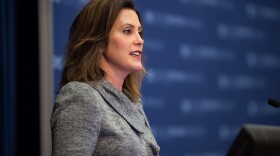Governor Gretchen Whitmer has had an exceptionally challenging year. She issued executive orders to lock down much of the state's economy in order to deal with a deadly spike in COVID-19 cases. She reached a deal with legislative leaders that kept funding for schools whole amid economic stagnation. And, as the world now knows, she was the target of an alleged terrorist plot that ended with state and federal charges for 14 men.
Whitmer joined Stateside to discuss the alleged kidnapping plot, her coronavirus strategy, and her frustration with Republican legislative leaders.
The Michigan Supreme Court ruled in early October that Whitmer violated the state's constitution by extending her emergency powers without legislative approval. Whitmer says the court decision has slowed down her ability to implement change that is needed as schools are back in session and the flu season begins. While some of the orders have been replaced by those issued by the Michigan Department of Health and Human Services, others will need to be approved by the Legislature. And “none of it as quick or nimble as the executive orders were,” the governor said.
For Whitmer, the state’s public health is directly linked to the state’s financial health. She says that Michigan has had one of the strongest economic recoveries during the pandemic because of the tougher public health policies she put into place early on.
“We know that keeping our arms around the health crisis is absolutely critical to our ability to get the economic crisis under control as well,” said Whitmer.
Whitmer touched on the alleged plot by extremist militia members to kidnap her, and said that the growth of these kinds of extremist beliefs is due, in part, to politicians whose rhetoric emboldens them.
“We’ve always known that there were groups out there. In the last four years, the rhetoric has heightened, the space and legitimacy given has increased, and I think that we’re now in a moment where these groups feel emboldened and are growing their ranks because of a lot of the political rhetoric we’re seeing in our country.”
Whitmer says she’s in regular communication with the state’s top Republican legislative leaders, state Senator Mike Shirkey and Speaker of the House Lee Chatfield, but is frustrated by their support of the anti-lockdown protests. She says she has been urging them to “help bring the heat down” amid increased threats against her and her family.
“And instead of doing that, they participated in these rallies. They’ve met with these, you know, groups. And they’ve emboldened them, and I think that’s a very real concern.”
Whitmer says that having dialouge across the political spectrum and creating opportunity across the state is crucial in combatting extremist beliefs. She's hopeful that she and Republican lawmakers will be able to find some common ground after the November election.
"But it’s certainly been a challenge,” she added.





